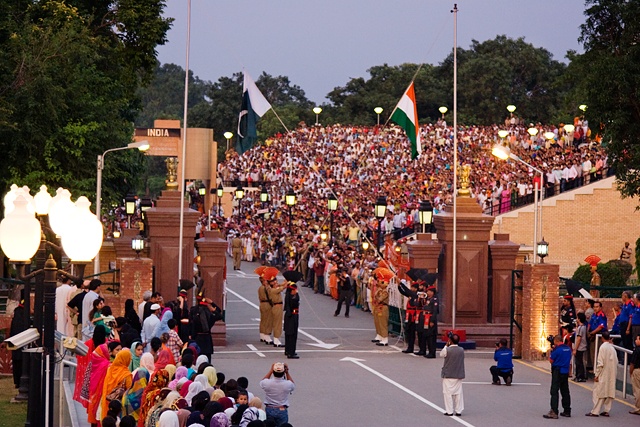
By Saima Afzal
Pakistan is the most affected country in the war against terrorism since 9/11. It was just only one terrorist incident in the US but Pakistan has faced and still facing number of such attacks on her territory on daily basis, being an ally and a front line state in the US war against terrorism.
Pakistani Ex-foreign secretary Shamshad Ahmed, speaking on a topic ‘Flashpoint of the South Asian Security – A review of Political and Security Architecture in the sub-continent’ at a conference, organized by Strategic Vision Institute (SVI), an Islamabad-based think-tank, that the Foreign Office was not involved in drafting of 2004 statement that led to the initiation of Composite Dialogue with India. He further said that, President General Musharraf after a meeting with Indian counterpart Prime Minister Vajpayee at a SAARC summit, held in Islamabad on January 6, 2004, had given an assurance that ‘he will not permit any territory under Pakistan’s control to be used for terrorism in any manner’. Musharraf had in effect given an affidavit that there would be no cross border activity from Pakistani side. This could be implied as an admission that ‘whatsoever happened in the past was Pakistan’s fault’.
Mr. Shamshad stated that it was Musharraf, who took dictation from Washington to bring normalcy in its relation with India. This statement widely circulated in international and national electronic and print media. He further indicated that Musharraf admitted that Pakistan is a terrorist state and in the past its territory was being used in terrorist act against India whereas truth is that Pakistan is victim of terrorism by itself.
India has always tried to gain international sympathy by declaring herself as a victim of terrorism whereas her ambitions are to get hegemonic status in South Asia. India has been using different covert and overt tactics to declare Pakistan as epicenter of terrorism. On one side it is an utmost desire of India that Pakistan’s forces should be kept busy on her western border along Afghanistan permanently so that they could not develop amicable bilateral relations and to keep further destabilizing Pakistan. On the other side the Indo-Afghan nexus has sever security implications for Pakistan because it is claimed that Indian consulates in Afghanistan are involved in supplying sophisticated weapons to non-state actors against Pakistan.
Unfortunately, India has adopted a policy non-serious attitude and had never desired to engage in a serious bilateral dialogue with Pakistan. India unilaterally cancelled the Foreign Secretary level talks which were scheduled to be held on August 25, 2014 without any notification. Further, India owes to deliberate and unprovoked violation of ceasefire agreement and continues firing on LoC in Jammu and Kashmir and working Boundary between India and Pakistan.
According to Dawn recent report during the period October 1-10, 2014, 20 times ceasefire violations along the Line of Control (LoC) and 22 times violations along the Working Boundary were reported, that resulting in 12 casualties, 52 civilians and 9 injured military personnel on the Pakistani side. From June to August 2014, there were 99 ceasefire violations along the LoC and 32 along the Working Boundary. In sum total, during 2014, 174 ceasefire violations along the LoC and 60 along the Working Boundary have been reported. While exercising its right of self-defense, Pakistan has exercised utmost restraint and responsibility in responding to these provocations. While neither the US nor the international community is taking these violations of India seriously.
The existing elected government of Bharatiya Janata Party (BJP) seems to be more aggressive and posing serious threat to the security of Pakistan. Mr. Modi has strong Hindu nationalism and his attitude is completely aggressive towards Pakistan. By adopting the aggressive posture, Modi is trying to get hegemonic status for India in the region which is actually a very realistic approach but very destructive in true sense, which will obviously bring instability not only in Pakistan but also for the whole South Asian region.
On one side the US is asking Pakistan cooperation in term of military assistance without keeping in mind that Pakistan is the most affected country in war against terrorism. While on the other side it is India, who is continuously violating LOC and accusing Pakistan as the harbor of terrorism. International community and India should realize the sensitivity of the issue and refrain from blaming Pakistan involve in terrorist act rather they should recognize the sacrifices and price which Pakistan has paid being a partner in war against terrorism. It is unjustified to say that Pakistan soil has been used against terrorist attacks against India without providing any concert evidences.
Pakistan want durable peace in the region which cannot be achieved until the Kashmir issue is resolved. Prime Minister Nawaz Sharif on September 26, 2014, while addressing to the UN General Assembly emphasized, that the core issue of Jammu and Kashmir should be resolved according to the wishes of the people of Kashmir. It is the right time that both major and nuclear states of South Asia should play their role as mature and rational states in the settlement of Kashmir dispute for the long lasting and durable peace and stability of the region.




